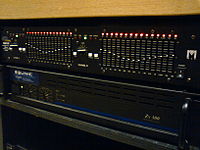
Photo from wikipedia
This paper presents a gain-boosting technique for two-port N-path band-pass filters (BPFs) based on the principle of discrete-time parametric amplification in MOS devices. The proposed technique also acts as a… Click to show full abstract
This paper presents a gain-boosting technique for two-port N-path band-pass filters (BPFs) based on the principle of discrete-time parametric amplification in MOS devices. The proposed technique also acts as a noise figure (NF) reduction technique due to the low-noise amplification before the output commutation. Analytical expressions for gain, NF, and input impedance of the proposed parametrically gain-boosted N-path BPF are derived using linear periodically time-variant (LPTV) network analysis and have been verified through simulations. The measurement results of a pseudo-differential eight-path BPF, implemented in a 180 nm CMOS technology, are presented. The center frequency of the implemented filter is tunable from 0.05 GHz to 0.4 GHz with a Q varying from 4 to 18. The gain of the filter is programmable with the input common-mode voltage. At 0.4 GHz, the filter achieves a variable gain of 2–8 dB over the input common-mode range of 0.55 V to 0.85 V. At every tuned frequency, the filter has a peak gain ≥8 dB, NF < 4.1 dB, and in-band third-order intercept power (IB-IIP3) >0 dBm. It is also shown in simulations that the proposed gain-boosting technique reduced the NF of the filter by >2.2 dB while consuming a dynamic power in the range of 3.8-31 mW per filter.
Journal Title: IEEE Transactions on Circuits and Systems I: Regular Papers
Year Published: 2019
Link to full text (if available)
Share on Social Media: Sign Up to like & get
recommendations!